北师大版初二英语下册unit.doc
初二下英语北师大版书
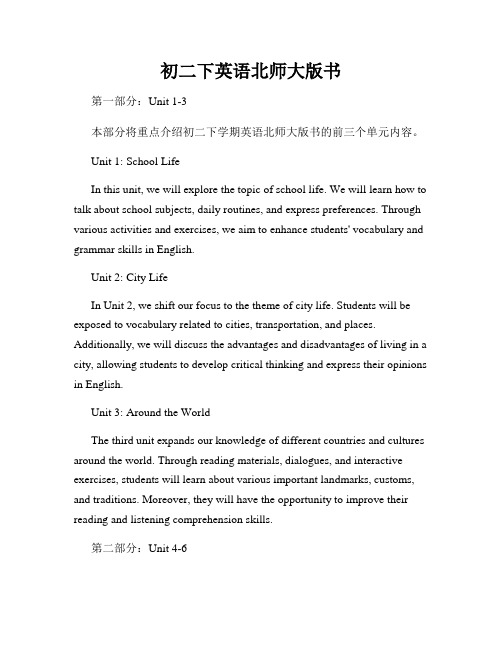
初二下英语北师大版书第一部分:Unit 1-3本部分将重点介绍初二下学期英语北师大版书的前三个单元内容。
Unit 1: School LifeIn this unit, we will explore the topic of school life. We will learn how to talk about school subjects, daily routines, and express preferences. Through various activities and exercises, we aim to enhance students' vocabulary and grammar skills in English.Unit 2: City LifeIn Unit 2, we shift our focus to the theme of city life. Students will be exposed to vocabulary related to cities, transportation, and places. Additionally, we will discuss the advantages and disadvantages of living in a city, allowing students to develop critical thinking and express their opinions in English.Unit 3: Around the WorldThe third unit expands our knowledge of different countries and cultures around the world. Through reading materials, dialogues, and interactive exercises, students will learn about various important landmarks, customs, and traditions. Moreover, they will have the opportunity to improve their reading and listening comprehension skills.第二部分:Unit 4-6本部分将重点介绍初二下学期英语北师大版书的第四至第六个单元内容。
北师大版八年级下册英语教案(全册)
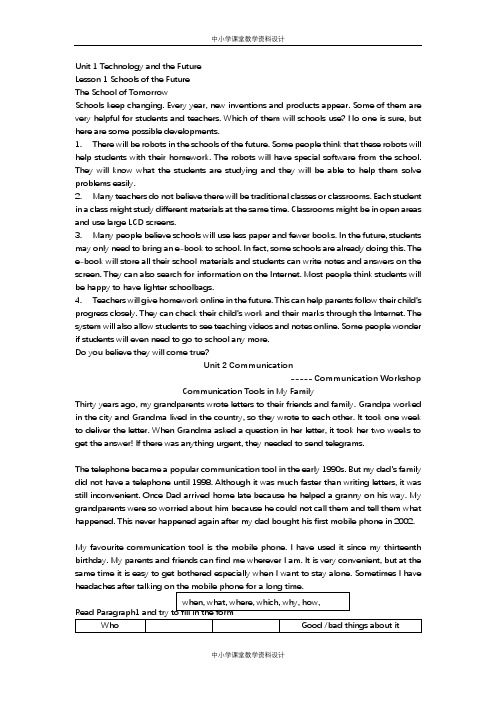
Unit 1 Technology and the FutureLesson 1 Schools of the FutureThe School of TomorrowSchools keep changing. Every year, new inventions and products appear. Some of them are very helpful for students and teachers. Which of them will schools use? No one is sure, but here are some possible developments.1. There will be robots in the schools of the future. Some people think that these robots will help students with their homework. The robots will have special software from the school. They will know what the students are studying and they will be able to help them solve problems easily.2. Many teachers do not believe there will be traditional classes or classrooms. Each student in a class might study different materials at the same time. Classrooms might be in open areas and use large LCD screens.3. Many people believe schools will use less paper and fewer books. In the future, students may only need to bring an e-book to school. In fact, some schools are already doing this. The e-book will store all their school materials and students can write notes and answers on the screen. They can also search for information on the Internet. Most people think students will be happy to have lighter schoolbags.4. Teachers will give homework online in the future. This c an help parents follow their child’s progress closely. They can check their child’s work and their marks through the Internet. The system will also allow students to see teaching videos and notes online. Some people wonder if students will even need to go to school any more.Do you believe they will come true?Unit 2 Communication----- Communication WorkshopCommunication Tools in My FamilyThirty years ago, my grandparents wrote letters to their friends and family. Grandpa worked in the city and Grandma lived in the country, so they wrote to each other. It took one week to deliver the letter. When Grandma asked a question in her letter, it took her two weeks to get the answer! If there was anything urgent, they needed to send telegrams.The telephone became a popular communication tool in the early 1990s. But my dad’s family did not have a telephone until 1998. Although it was much faster than writing letters, it was still inconvenient. Once Dad arrived home late because he helped a granny on his way. My grandparents were so worried about him because he could not call them and tell them what happened. This never happened again after my dad bought his first mobile phone in 2002.My favourite communication tool is the mobile phone. I have used it since my thirteenth birthday. My parents and friends can find me wherever I am. It is very convenient, but at the same time it is easy to get bothered especially when I want to stay alone. Sometimes I haveGood things:Bad things:Read Paragraph2 and try to fill in the formWho Good /bad things about itGood things: Bad things:Read Paragraph3 and try to fill in the formWho Good /bad things about itGood things: Bad things:Who When How Good /bad things about itGood things: Bad things:My grandparents Thirty years ago Wroteletters took one week to deliver a letterMy dad In 1998 Used telephone much faster thanwriting letters not convenient enoughMe Since mythirteenthbirthday Used mobilephoneconvenient have headachesafter talking for along timeHow to write a good composition?1.2.3.4.5.6.The first draft:Communication Tools in My Family __________________________________________________________________________ __________________________________________________________________________ __________________________________________________________________________ __________________________________________________________________________ __________________________________________________________________________ __________________________________________________________________________ __________________________________________________________________________ __________________________________________________________________________ __________________________________________________________________________ __________________________________________________________________________ __________________________________________________________________________ __________________________________________________________________________ __________________________________________________________________________ __________________________________________________________________________ __________________________________________________________________________The second draft:Communication Tools in My Family________________________________________________________________________________________________________________________________________________________________________________________________________________________________________________________________________________________________________________________________________________________________________________________________________________________________________________________________________________________________________________________________________________________________________________________________________________________________________________________________________________________________________________________________________________________________________________________________________________________________________________________________________________________________________________________________________________________________________________________________________________________________________________________________________________________________________________________________________________________________________________________________________________________________教材分析本课是北师大版《初中英语》八年级下册教材第二单元的最后一课,话题为人际交流。
北师版初二(下)英语第2讲:unit 1语法篇 (学生版)-word文档
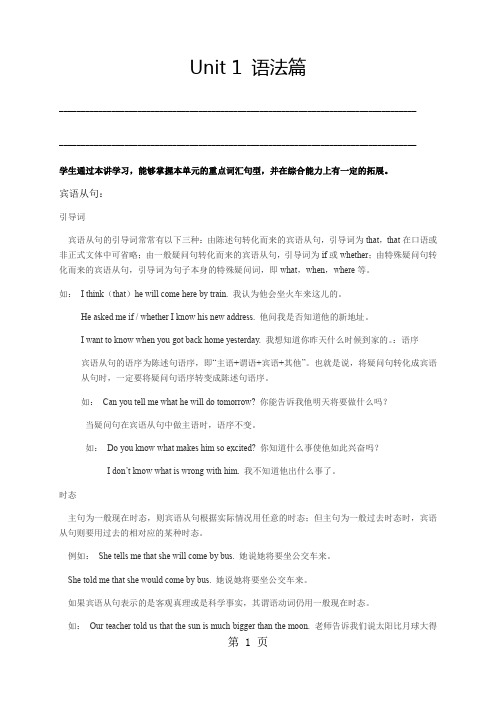
Unit 1 语法篇____________________________________________________________________________________________________________________________________________________________________学生通过本讲学习,能够掌握本单元的重点词汇句型,并在综合能力上有一定的拓展。
宾语从句:引导词宾语从句的引导词常常有以下三种:由陈述句转化而来的宾语从句,引导词为that,that在口语或非正式文体中可省略;由一般疑问句转化而来的宾语从句,引导词为if或whether;由特殊疑问句转化而来的宾语从句,引导词为句子本身的特殊疑问词,即what,when,where等。
如:I think(that)he will come here by train. 我认为他会坐火车来这儿的。
He asked me if / whether I know his new address. 他问我是否知道他的新地址。
I want to know when you got back home yesterday. 我想知道你昨天什么时候到家的。
:语序宾语从句的语序为陈述句语序,即“主语+谓语+宾语+其他”。
也就是说,将疑问句转化成宾语从句时,一定要将疑问句语序转变成陈述句语序。
如:Can you tell me what he will do tomorrow? 你能告诉我他明天将要做什么吗?当疑问句在宾语从句中做主语时,语序不变。
如:Do you know what makes him so excited? 你知道什么事使他如此兴奋吗?I don’t know what is wrong with him. 我不知道他出什么事了。
时态主句为一般现在时态,则宾语从句根据实际情况用任意的时态;但主句为一般过去时态时,宾语从句则要用过去的相对应的某种时态。
北师大版英语八下Unit 5 Lesson 13 A Daughter’s Letter (第1课时

北师大版英语八下Unit 5 Lesson 13 A Daughter’s Letter (第1课时)教学设计一. 教材分析北师大版英语八下Unit 5 Lesson 13 A Daughter’s Letter 是一篇关于亲情的文章,通过一位女儿给父亲写的信,表达了她对父亲的感激和爱意。
本节课的主要内容是学习信件的格式和如何表达感激之情。
教材内容丰富,插图生动,有利于激发学生的学习兴趣。
二. 学情分析学生在学习本节课之前,已经掌握了信件的基本格式,同时也具备了一定的阅读理解能力。
然而,对于如何运用英语表达感激之情,部分学生可能还存在一定的困难。
因此,在教学过程中,教师需要关注学生的个体差异,给予不同程度的学生适当的帮助。
三. 教学目标1.知识目标:–学习信件的格式;–掌握表达感激之情的相关词汇和句型。
2.能力目标:–能够阅读并理解信件内容;–能够运用英语表达感激之情。
3.情感目标:–培养学生对父母的感激之情;–增强学生的家庭观念。
四. 教学重难点1.重点:信件的格式,表达感激之情的词汇和句型。
2.难点:如何运用英语准确地表达感激之情。
五. 教学方法1.情境教学法:通过创设情境,让学生在实际情境中学习并运用英语。
2.交际法:引导学生进行相互交流,提高学生的口语表达能力。
3.情感教学法:通过讲述亲情故事,激发学生的情感共鸣。
六. 教学准备1.准备信件样本,用于教学演示。
2.准备相关词汇和句型的卡片,方便学生学习和操练。
3.准备PPT,用于呈现教学内容。
4.准备录音设备,用于播放听力材料。
七. 教学过程1.导入(5分钟)利用PPT展示一张父母的照片,引导学生谈论自己的父母,分享他们对父母的感激之情。
2.呈现(10分钟)呈现信件样本,引导学生关注信件的格式,并讲解信件的基本结构。
3.操练(15分钟)分组进行角色扮演,让学生模拟写一封给父母的感谢信,并互相交换阅读,纠正发音和语法错误。
4.巩固(10分钟)让学生在小组内互相分享自己的感谢信,鼓励他们用英语表达感激之情。
北师大版英语八下Unit 5 Lesson 13 A Daughter’s Letter (第2课时
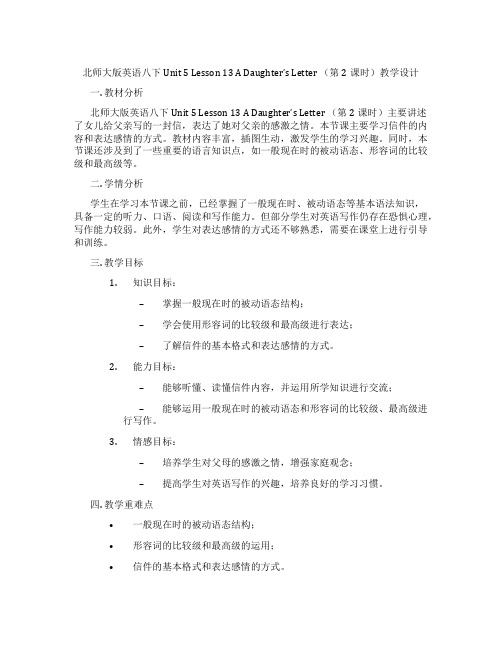
北师大版英语八下Unit 5 Lesson 13 A Daughter’s Letter (第2课时)教学设计一. 教材分析北师大版英语八下Unit 5 Lesson 13 A Daughter’s Letter (第2课时)主要讲述了女儿给父亲写的一封信,表达了她对父亲的感激之情。
本节课主要学习信件的内容和表达感情的方式。
教材内容丰富,插图生动,激发学生的学习兴趣。
同时,本节课还涉及到了一些重要的语言知识点,如一般现在时的被动语态、形容词的比较级和最高级等。
二. 学情分析学生在学习本节课之前,已经掌握了一般现在时、被动语态等基本语法知识,具备一定的听力、口语、阅读和写作能力。
但部分学生对英语写作仍存在恐惧心理,写作能力较弱。
此外,学生对表达感情的方式还不够熟悉,需要在课堂上进行引导和训练。
三. 教学目标1.知识目标:–掌握一般现在时的被动语态结构;–学会使用形容词的比较级和最高级进行表达;–了解信件的基本格式和表达感情的方式。
2.能力目标:–能够听懂、读懂信件内容,并运用所学知识进行交流;–能够运用一般现在时的被动语态和形容词的比较级、最高级进行写作。
3.情感目标:–培养学生对父母的感激之情,增强家庭观念;–提高学生对英语写作的兴趣,培养良好的学习习惯。
四. 教学重难点•一般现在时的被动语态结构;•形容词的比较级和最高级的运用;•信件的基本格式和表达感情的方式。
•一般现在时的被动语态的运用;•形容词的比较级和最高级的运用。
五. 教学方法1.情境教学法:通过设定情境,让学生在实际语境中学习、运用英语;2.交际法:引导学生进行pr work、group work等活动,提高学生的口语交际能力;3.任务型教学法:通过完成任务,激发学生的学习兴趣,培养学生的实践能力;4.情感教学法:以情感人,引导学生表达对家人的感激之情。
六. 教学准备1.教材:北师大版英语八下Unit 5 Lesson 13;2.课件:制作与本节课相关的PPT课件;3.练习题:准备一些练习题,用于巩固所学知识;4.信纸、信封等:用于写作练习。
北师大版八年级下册全册英语课件
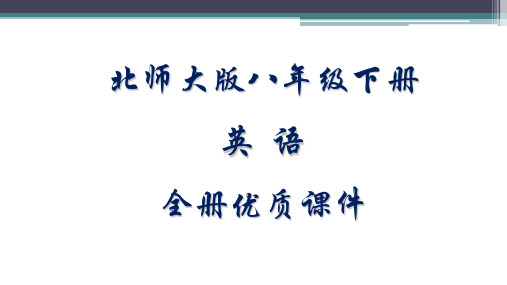
2nd-reading 1 Robot Teachers
• There will be robots in the schools of the future. Some people think that these robots will help students with their homework. The robots will have special software from the school. They will know what the students are studying and they will be able to help them solve problems easily.
students can write notes and answers on the screen. Q: What will students do with e-books ? They can also search for information on the Internet.
2nd-reading 4 Online learning
2nd-reading
• Read and match the headings with the correct paragraphs.
• a New Ideas for Classes 4 • b Online Learning 3 • c E-books for School 1 • d Robot Teachers
Teachers will give homework online in the future. Parents can Q: What will people online in thethe future? check their child’s work anddo their marks through Internet. The system will also allow students to see teaching videos and notes online.
新北师大版英语八年级下册《unit 11 working with animals》part 2优秀教案(重点资料).doc
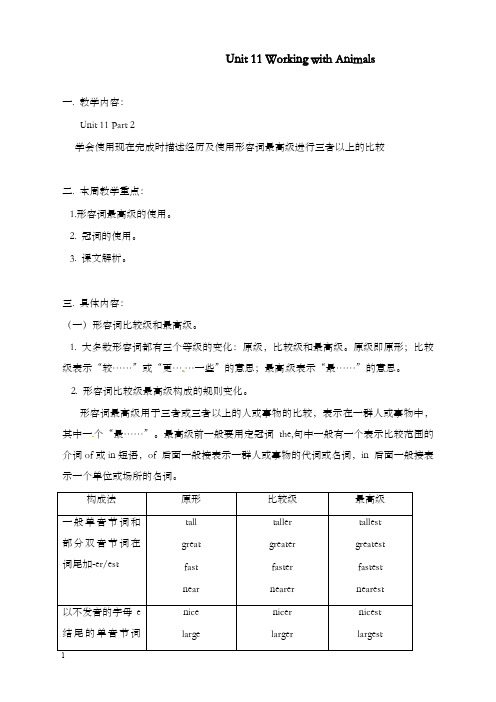
Unit 11 Working with Animals一. 教学内容:Unit 11 Part 2学会使用现在完成时描述经历及使用形容词最高级进行三者以上的比较二. 本周教学重点:1.形容词最高级的使用。
2. 冠词的使用。
3. 课文解析。
三. 具体内容:(一)形容词比较级和最高级。
1. 大多数形容词都有三个等级的变化:原级,比较级和最高级。
原级即原形;比较级表示“较……”或“更……一些”的意思;最高级表示“最……”的意思。
2. 形容词比较级最高级构成的规则变化。
形容词最高级用于三者或三者以上的人或事物的比较,表示在一群人或事物中,其中一个“最……”。
最高级前一般要用定冠词the,句中一般有一个表示比较范围的介词of或in短语,of 后面一般接表示一群人或事物的代词或名词,in 后面一般接表示一个单位或场所的名词。
thinnermos tpopular—more popular—the most popularimportant—more important—the most importantserious—more serious—the most seriousoutgoing—more outgoing –th e most outgoing5. 最高级的基本用法:1)三者或三者以上相比较用“the+最高级+名词+范围”。
This is the cleanest place of the city.Jack is the tallest boy in our class.2)表示“最……之一”,用“one of the +形容词最高级+复数名词”This is one of the most interesting books that I’ve ever read.3)形容词的最高级前面必须加定冠词the,但当形容词最高级前面有物主代词修饰时,则不加the.This is my the best friend.This is my best friend.Today is happiest day of my life.Today is the happiest day of my life.(二)冠词的用法:不定冠词的用法:1)用于第一次提到的单数可数名词前,表示类别,泛指某一类人或物。
北师大版八年级下册英语电子课本可打印
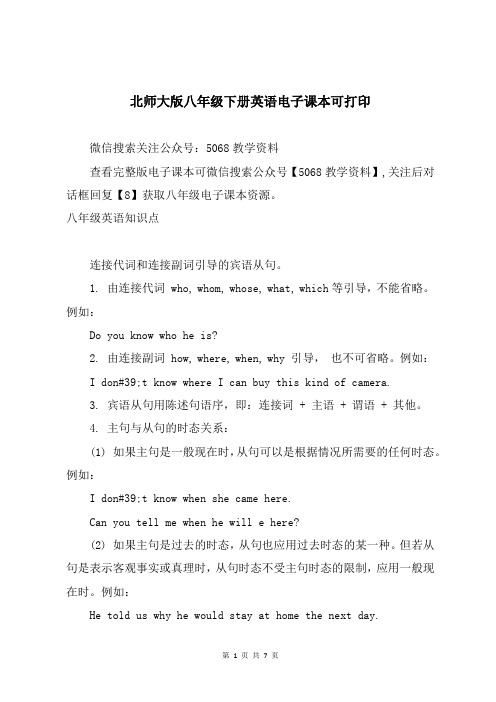
北师大版八年级下册英语电子课本可打印微信搜索关注公众号:5068教学资料查看完整版电子课本可微信搜索公众号【5068教学资料】,关注后对话框回复【8】获取八年级电子课本资源。
八年级英语知识点连接代词和连接副词引导的宾语从句。
1. 由连接代词 who, whom, whose, what, which等引导,不能省略。
例如:Do you know who he is?2. 由连接副词 how, where, when, why 引导,也不可省略。
例如:I don#39;t know where I can buy this kind of camera.3. 宾语从句用陈述句语序,即:连接词 + 主语 + 谓语 + 其他。
4. 主句与从句的时态关系:(1) 如果主句是一般现在时,从句可以是根据情况所需要的任何时态。
例如:I don#39;t know when she came here.Can you tell me when he will e here?(2) 如果主句是过去的时态,从句也应用过去时态的某一种。
但若从句是表示客观事实或真理时,从句时态不受主句时态的限制,应用一般现在时。
例如:He told us why he would stay at home the next day.The teacher explained how the earth goes around the sun. 5. 某些由连接代词或连接副词引导的宾语从句可改为含“特殊疑问词 + 动词不定式”结构的简单句。
例如:Can you tell me where I can buy this book?Can you tell me where to buy this book?八年级下册英语练习题Ⅰ. 词汇根据句意及首字母提示,写出空白处所缺的单词?1. There is one child left a______in the room.2. When the t______lights are red, you must stop and wait.3. Look! It’s raining outside. You’d better put on your raincoat or take an u______ .4. —It’s fine today.—I think so. At l______it’s warm.5. There were so many nice things here, so I couldn’t decide which one to c ______ as a birthday gift for my mom.6. N______Li Lei nor Liu Mei is in the classroom now.7. The old man q______likes collecting coins.8. When did you r______from Australia?9. Did you r______her letter the day before yesterday?10. We must keep our classroom c______every day.B) 用括号内所给单词的适当形式填空?1. We all know that France is a______(Europe) country.2. There are different food cultures between China and______(west) countries.3. Several______(Russia) came to our school last week.4. “Excuse me, can I take this seat?” he said to the young woman______(polite).5. At______(one) I didn’t like him, but now I do.6. I want to make______(friend) with you.7. What are those______(child) doing over there?8. Let’s listen to his______(suggest).9. There are a lot of______(mouse) in the old house.10. The young man fell______(sleep) as soon as he lay down. C) 用方框内所给短语的适当形式填空?take away, run out of, be interested in, in order to, more than, wait in line, at last, take care, put out, get annoyed1. Mr Johnson______Beijing Opera very much.2. You must______ when you go shopping.3. When did the firemen______ the fire?4. There are______ two hundred people present at the meeting.5. We can’t buy that doll because we have______ money.6. These shoes are dirty. Please______ them______.7. I will______ when other people cut in line.8.______ we finished the work on time.9.______ not to break the glass on the table.10.______ improve your English, you must study hard.初二下册英语教学计划一、指导思想以“英语课程标准”为宗旨,适应新课程改革的需要,面向全体学生,提高学生的人文素养,增强实践能力和创新精神。
北师大版八年级英语下册全册课件【完整版】
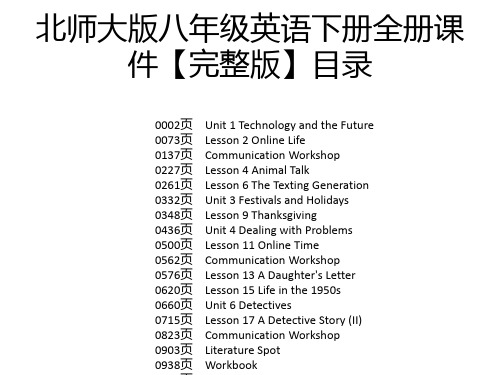
Communication Workshop
北师大版八年级英语下册全册课件 【完整版】
Unit 3 Festivals and Holidays
北师大版八年级英语下册全册课件 【完整版】
北师大版八年级英语下册全册课件 【完整版】
Lesson 3 Tomorrow's Jobs
北师大版八年级英语下册全册课件 【完整版】
Communication Workshop
北师大版八年级英语下册全册课 件【完整版】目录
0002页 0073页 0137页 0227页 0261页 0332页 0348页 0436页 0500页 0562页 0576页 0620页 0660页 0715页 0823页 0903页 0938页
Unit 1 Technology and the Future Lesson 2 Online Life Communication Workshop Lesson 4 Animal Talk Lesson 6 The Texting Generation Unit 3 Festivals and Holidays Lesson 9 Thanksgiving Unit 4 Dealing with Problems Lesson 11 Online Time Communication Workshop Lesson 13 A Daughter's Letter Lesson 15 Life in the 1950s Unit 6 Detectives Lesson 17 A Detective Story (II) Communication Workshop Literature Spot Workbook
北师大版八年级英语下册全册课件 【完整版】
北师大版八年级英语下册Unit 1 Technology and the Future Lesson

2nd-reading
4 Online learning
Teachers will give homework online in the future. This can help parents follow their child’s progress closely. They can check their child’s work and their marks through the Internet. The system will also allow students to see teaching videos and notes online. Some people wonder if students will even need to go to schools any more.
The delevopment of the schools in the future.
2nd-reading
Read and match the headings with the correct paragraphs.
a New Ideas for Classes b Online Learning c E-books for School d Robot Teachers
Q: What will robot teachers do in the fufure?
2nd-reading
2 New Ideas for Classes
Many teachers do not believe there will be traditional classes or classrooms. Each student in a class might study different materials at the same time. classrooms might be in open areas and use large LCD screens.
北师大版英语八下Unit8TransportationPart2word教案
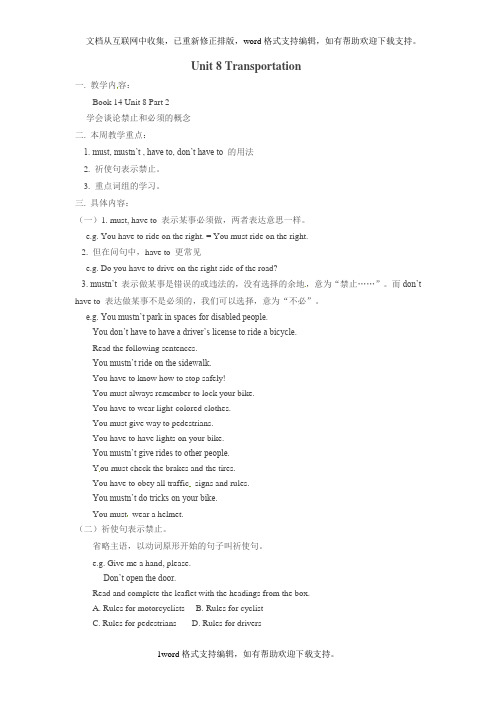
Unit 8 Transportation一. 教学内容:Book 14 Unit 8 Part 2学会谈论禁止和必须的概念二. 本周教学重点:1. must, mustn’t , have to, don’t have to 的用法2. 祈使句表示禁止。
3. 重点词组的学习。
三. 具体内容:(一)1. must, have to 表示某事必须做,两者表达意思一样。
e.g. You have to ride on the right. = You must ride on the right.2. 但在问句中,have to 更常见e.g. Do you have to drive on the right side of the road?3. mustn’t 表示做某事是错误的或违法的,没有选择的余地,意为“禁止……”。
而don’t have to 表达做某事不是必须的,我们可以选择,意为“不必”。
e.g. You mustn’t park in spaces for disabled people.You don’t have to have a driver’s license to ride a bicycle.Read the following sentences.You mustn’t ride on the sidewalk.You have to know how to stop safely!You must always remember to lock your bike.You have to wear light-colored clothes.You must give way to pedestrians.You have to have lights on your bike.You mustn’t give rides to other people.Y ou must check the brakes and the tires.You have to obey all traffic signs and rules.You mustn’t do tricks on your bike.You must wear a helmet.(二)祈使句表示禁止。
北师大版初二英语下册unit1
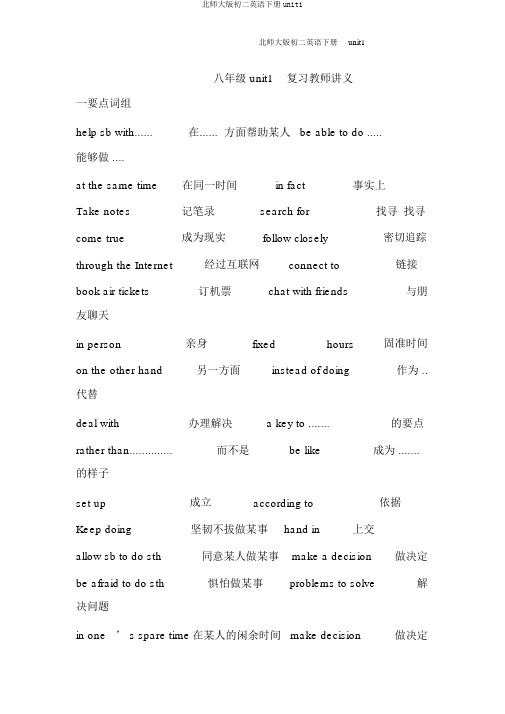
北师大版初二英语下册unit1八年级 unit1复习教师讲义一要点词组help sb with......在...... 方面帮助某人 be able to do .....能够做 ....at the same time在同一时间in fact事实上Take notes记笔录search for找寻找寻come true成为现实follow closely密切追踪through the Internet经过互联网connect to链接book air tickets订机票chat with friends与朋友聊天in person亲身fixed hours固准时间on the other hand另一方面instead of doing作为 ..代替deal with办理解决 a key to .......的要点rather than..............而不是be like成为 .......的样子set up成立according to依据Keep doing坚韧不拔做某事hand in上交allow sb to do sth同意某人做某事make a decision做决定be afraid to do sth惧怕做某事problems to solve解决问题in one ’ s spare time在某人的闲余时间 make decision做决定It’ s common for sb to do...............对某人来说做某事很平时当堂训练一选择1Can you _______information on the internetA search forB find outC search outD find out2Many people think schools will use_____paper and ____-books in the futureA less fewerB fewer lessC fewer fewerD lessfewer3 i will buy clothes online _______shopping in marketA instead ofB rather thanC set up4 Reading a lot is _______learn English wellA a key toB a key forC a way to5 In my spare time i always ___________in a coffee shopA chat to friendsB chat with friendsC play basket ball依据中文达成句子1你常常在课后帮助你的妈妈做家务吗?Do you usually_________your mother ________________after school?2你有能力独立解决这个问题吗?_______you______________solve the problems alone?3妈妈同意我在周末看电视My mum __________me ______________________ T v on weekends.4在讲堂上使用智好手机来做笔录将会成为可能。
- 1、下载文档前请自行甄别文档内容的完整性,平台不提供额外的编辑、内容补充、找答案等附加服务。
- 2、"仅部分预览"的文档,不可在线预览部分如存在完整性等问题,可反馈申请退款(可完整预览的文档不适用该条件!)。
- 3、如文档侵犯您的权益,请联系客服反馈,我们会尽快为您处理(人工客服工作时间:9:00-18:30)。
八年级 unit1复习教师讲义一重点词组help sb with......在......方面帮助某人be able to do .....能够做.... at the same time在同一时间in fact事实上Take notes记笔记search for寻找搜寻come true成为现实follow closely紧密跟踪through the Internet通过互联网connect to链接book air tickets订机票chat with friends与朋友聊天in person亲自fixed hours固定时间on the other hand另一方面instead of doing作为..替代deal with处理解决 a key to .......的关键rather than..............而不是be like成为.......的样子set up建立according to根据Keep doing坚持不懈做某事hand in上交allow sb to do sth允许某人做某事make a decision做决定be afraid to do sth害怕做某事problems to solve解决问题in one ’s spare time在某人的闲余时间make decision做决定It ’s common for sb to do...............对某人来说做某事很平常当堂训练一选择1Can you _______information on the internetA search forB find outC search outD find out2Many people think schools will use_____paper and ____-books in the futureA less fewerB fewer lessC fewer fewerD less fewer3 i will buy clothes online _______shopping in marketA instead ofB rather thanC set up4 Reading a lot is _______learn English wellA a key toB a key forC a way to5 In my spare time i always ___________in a coffee shopA chat to friendsB chat with friendsC play basket ball根据中文完成句子1你经常在课后帮助你的妈妈做家务吗?Do you usually _________your mother ________________after school?2你有能力独立解决这个问题吗?_______you______________solve the problems alone?3妈妈允许我在周末看电视My mum __________me ______________________ T v on weekends.4在课堂上使用智能手机来做笔记将会成为可能。
It will be____________to use smart phones in the class to __________________- . 5同一时间,不同的学生在做不同的阅读练习。
Different students are doing different reading ____________________.6在固定的时间固定的工作很无聊It ’s boring to work__________________________________________7 对于很多人来说经常换工作是一件和普通的事情.It is common _________ for people ________________________very often.8今天天气很热,我想去游泳不想去逛街。
It ’s hot today,i want to go swimming ____________________go shopping. 9新年晚会就要到了,你准备好了吗?The New Year party is coming,________________________it.10拥有应对困难的能力对我来说非常重要。
It ’s____________________________________________to deal with difficult situations.二重点语法宾语从句结构主句引导词从句主语谓语引导词主语谓语宾语some people think(that)these will help studentsrobotsthey will know what the are studyingstudentssome people wonder if students will even to go to school anyneed more宾语从句句型结构主语 +谓语动词 +引导词 +主语 +谓语 +宾语引导词: what、 why、 that( 可省略)、 when 、if、whether、等从句语序为陈述句语序(1)that 引导宾语从句时 , that 可省略。
Eg: She said,“I want to go there”She said (that) she wanted to go there. 一般情况下, whether 和 if可以互用,但有些情况例外a.介词短语后只用whether不用ifeg: We are talking about whether we'll go on the panic.b.引导词与动词不定式或or not连用时,只用whether.eg:I can ’t say whether or not he will come on time2. 宾语从句时态a. 主句为一般现在时,从句不受主句的限制eg: Do you know if/whether he has seen the film?I ’m sorry to hear that your father is ill.She says she is going to go to Beijing next week.He tells me that his sister came back yesterday.当堂练习 2you decided ________for Australia?A. when will you leaveB. when do you leaveC. you will leave whenD. when you will leaveyou tell me _________ ?A. where does Tom liveB. where Tom livedC. Tom lives whereD. where Tom lives old man asked me ________ .A. where was the cinemaB. where is the cinemaC. where the cinema wasD. where was the way to the cinemathink _______ you will like him.A. thatB. ifC. whyD. howdidn ’t know _______ he will come or not.A. thatB. whetherC. weatherD. howwonder _________ .A. how much cost these shoesB. how much do these shoes costC. how much these shoes costD. how much are these shoes costhim ___.A. whose cup this isB. whose cup is thisC. this is whose cupD. whose is this cupdon’t know _________ .A. what time the movie startsB. what time starts the movieC. the time to start the movieD. the movie what time startsdoctor asked me how long ________ .A. was I illB. have I been illC. I have been illD. I had been ill weather forecast doesn’t say _________.A. if it rains tomorrowB. if does it rain tomorrowC. if it will rain tomorrowD. if will it rain tomorrowwant to know _________?A. where is the hospitalB. how old are youone knows ___ the professor will come to our school tomorrow to give us a talk or not.A. whenB. whetherC. whereD. ifone told us _________, so we need your help.A. how should we doB. what we should doC. what to doD. what should wedoasked me _________.A. whether I find out the sender of the moneyB. whether did I find out the sender of the moneyC. whether the sender of the money found outD. whether I found out the sender of the money16. I can't understand _____.A. what does Christmas meanB. what Christmas does meanC. what mean Christmas doesD. what Christmas means每日一练阅读 1A young officer was at a railway station. On his way home, he wanted to telephone his mother to tell her the time of his train, so that she could meet him at thestation in her car. He looked in all his pockets, but found that he did not havethe right money for the telephone, so he went outside and looked around for someone to help him.At last an old soldier came by, and the young officer stopped him and said,"Have you got change for ten pence?""Wait a moment, " the old soldier answered, beginning to put his hand in his pocket, "I'll see whether I can help you. ""Don't you know how to speak to an officer?" the young man said angrily. "Now let's start again. Have you got change for ten pence?""No, sir, " the old soldier answered quickly.60.The young officer wanted to telephone his mother to tell her _________. ( )A. that he was going to visit herB. when his train would leaveC. when his train would arriveD. that he was now at the railway station61.He looked around for help because he _________. ( )A. didn't have coins for the phone callB. had no money to make the phone callC. didn't have the local moneyD. wanted to change money62. The old soldier _________. ( )A. was glad to help himB. didn't know if he had coinsC. didn't want to help himD. was angry63.The young officer was angry because he thought the old soldier _________. ( )A. didn't know how to speak to himB. didn't want to help himC. didn't answer him correctlyD. was not friendly to him64.The old soldier in the story was_________. ( )A. cleverB. stupidC. politeD. friendly二December 25 is Christmas Day(圣诞节). Christmas is an important holiday inmany countries. On Christmas Day, most families get together for a big dinner.They give presents to each other and visit friends. The Christmas tree is animportant part of the Christmas holiday. Most families buy trees. The familiesdecorate( 装饰 ) the tree together. Parents usually tell their children that FatherChristmas comes during the night and brings presents to good children. Of course, Father Christmas isn ’t real. The parents of the children are really “Father Christmas ”. They put the presents under the tree or into their children ’s stocking(长统袜) after the children go to sleep.41. When is Christmas Day? __________.A. November 25B. December 25C. December 24D. December 2642.What do most families in America do on Christmas Day? __________.A. They only have a big dinner togetherB. They have a big dinner, exchange (交换) presents and visit friendsC. They just visit friends and exchange presentsexchange presents only43. Who is really“Father Christmas”? ___________.A. Their parentsB. Their fatherC. Their motherD. Father Christmas44. When Christmas Day is coming, the parents __________.A. usually tell their children that Father Christmas isn’t realB. tell their children that Father Christmas comes during the night and bringspresents to good childrentell their children that Father Christmas comes during the daytell their children that Father Christmas gives presents to poor children45. Whendid parents put the presents into their children’s stocking?__________.A. Before the children go to sleepB. After the children go to sleepC. December 26D. At midnight of December 25完型填空When Mr Smith retired(退休), he bought a small 1 in a village near the sea.He2it and hoped to live a quiet life in this house.But to his great surprise, manytourists cameto see his house in summerholidays,for it was the most 3 building in the village.From morning to night there were 4outside the house. They kept looking into the rooms through the windows and5of them even went into Mr Smith’s garden. This was too much for Mr Smith. Hedecided to ask the visitors to 6 .So he put a notice on the window. The notice said,“If you want 7 y our curiosity(好奇心),comein and look round. Price:twentydollars. ” Mr Smith was sure that the visitors More and more visitors came and Mr Smith had to 9 would 8 coming,but he was wrong. every day showing them aroundhis house. “I came here to 10 no t to work as a guide (导游) , ”he said angrily. In the end, he sold the house and moved away.(). garden B. shop C. house D. school()2. A. liked B. hated C. sold D. built()3. A. big B. interesting C. small D. clean ()4. A. children B. students C. parents D. tourists()5. A. no B. none C. many D. much()6. A. come B. leave C. stay D. play()7. A. to satisfy B. satisfy C. to satisfying D. satisfying ()8. A. go on B. stop C. continue D. not()9. A. take B. cost C. spend D. pay()10. A. play B. work C. watch D. retire。
